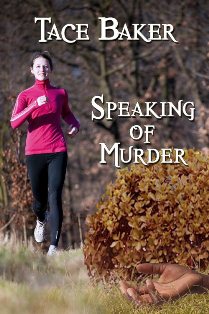 Hi, I’m Lauren Rousseau. I’m a linguistics professor at Agawam College, and while I teach basic and East Asian linguistics, I really enjoy identifying regional and foreign dialects and accents. I can spot somebody from the Ozarks even if she’s trying to hide it. I can hear which part of Boston my uncle came from, the fact that the nurse in the hospital speaks Russian and not Ukrainian, and that the proprietress at the Malian restaurant speaks Bambara and not Songhai.
Hi, I’m Lauren Rousseau. I’m a linguistics professor at Agawam College, and while I teach basic and East Asian linguistics, I really enjoy identifying regional and foreign dialects and accents. I can spot somebody from the Ozarks even if she’s trying to hide it. I can hear which part of Boston my uncle came from, the fact that the nurse in the hospital speaks Russian and not Ukrainian, and that the proprietress at the Malian restaurant speaks Bambara and not Songhai.
A day in my life in September usually starts with a run to clear my head. I head out from my condo in an antique house and run the hills of Labor in Vain Road out to the salt marshes, hoping I don’t stumble over a body or find my best friend Elise nearly dead like I did last spring. My hobby of accent identification really came in handy then.
After I feed my little dog Maisi and get ready for school, I drive to the college in the neighboring town of Millsbury. In Tace Baker’s novel, Speaking of Murder, you can read all about the academic intrigues I was involved in. You’ll also experience the threat a drug smuggling ring thrust on us. I don’t think it’s much of a spoiler to tell you that we all came out all right. Well, with the exception of my star student, who ended up very much dead.
Today’s lesson to my Linguistics 101 class is on katakana, the syllable-based writing system used primarily for non-Japanese, non-Asian words. Tomorrow we might talk about the etymology of the word ‘apron,” and how it was misanalyzed from “a napron”, a borrowing from the French, to be “an apron.” Then we’ll probably go on to talk about how the use of the article “an” is falling away in spoken American English, just more evidence of language change in progress.
Tonight my gourmet-cook sister Jackie and her lover Natalia have invited me for dinner, which is a good thing, since I basically don’t cook. That’s what sisters and takeout are for, aren’t they? Here’s what Jackie said one of the last times I asked what was on the menu.
“Comfort food. Orzo with sun-dried tomatoes, Kalamata olives, and spicy chicken sausage. Salad with avocado, pear, and pecans. Chocolates. Red wine. What more could a woman want?”
After dinner I have a date with Zac, my Haitian-American beau, who tends to want more commitment than I do. I struggle with that, but am very grateful that his expertise with video forensics helped identify my student’s killer. And that I hadn’t forgotten too much of my Japanese karate expertise when I came face to face with that killer.
I had a good summer, but unfortunately it included another body, this time a local politician, and a close call for me with a karate instructor I thought I could trust. Tace tells you the story of that adventure in Bluffing is Murder. Think we’ll have a nice, quiet fall semester?
Meet the author
Edith Maxwell is the author of SPEAKING OF MURDER (Barking Rain Press, September 2012, under pseudonym Tace Baker), which features Quaker linguistics professor Lauren Rousseau. Edith holds a PhD in linguistics and has been a member of Amesbury Monthly Meeting of Friends for several decades.
Edith also writes the Local Foods Mysteries. A TINE TO LIVE, A TINE TO DIE introduces organic farmer Cam Flaherty and a colorful Locavore Club (Kensington Publishing, June, 2013). Edith once owned and operated the smallest certified organic farm in Essex County, Massachusetts.
A technical writer and fourth-generation Californian, Edith also writes short crime fiction and is active in Sisters in Crime. She lives north of Boston in an antique house with her beau and three cats. Visit Tace at www.tacebaker.com or on Facebook. Edith can be found at www.edithmaxwell.com and on Facebook.
Books are available at retail and online booksellers.

So good to see this about Edith’s books, Dru. I’ve been waiting for them to come out. They sound great!
Thanks, Linda!
It does sound like a good book. I’m looking forward to reading it.
Hi Edith ~ Congratulations again! Your knowledge of linguistics is fascinating. Can’t wait to read this.
This book sounds great. I’m looking forward to seeing how the linguistics tidbits make their way into the mystery.